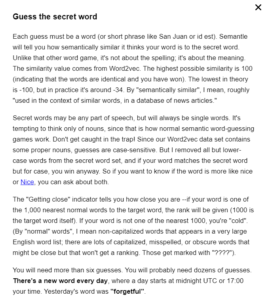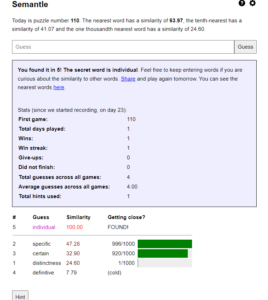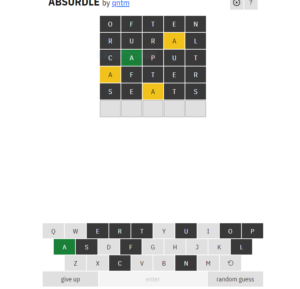Over the past few months, Wordle, a popular game in which players attempt to fill in squares with the correct letters to form a word, has taken off in popularity.
Fun fact: Wordle’s creator is named Josh Wardle.
Clearly if a game has this much buzz surrounding it, it has to be good.
So, why is Wordle so fun?
Computational linguist Jason Riggle offers us two answers: “But what makes Wordle so charming and addictive… is the sense of validation it offers—affirming our intuitions about language when we land on the correct answer. It’s a process akin to what happens when we converse with people we know well: They intuit what we mean quickly—even with minimal context—which makes us feel understood.”
Riggle further explains that, “In effect, it turns everyone into a linguist, forcing us to wrestle with sound fragments and stitch them together according to probability distributions.”
In this case, a probability distribution refers to how likely it is that certain letters will appear next to each other in a specific word, and also in general.
Wordle has essentially helped many more people think like linguists, which I full-heartedly support!
Recently, my sister mentioned that I would like Semantle, a spin-off of Wordle. In Semantle, word meaning is more important than word spelling, though spelling a word correctly in Semantle will probably help you out. I’ll include the directions below, as well as the attempt that I just made. I ended up guessing the right word, which has made my inner word geek brighten up for today.
There’s also another spin-off of Wordle that I found today called Absurdle. I found this one from reading the article that Professor Jason Riggle was interviewed for, which I’ll link at the very end of this post. When I typed “Absurdle” for this post, I got those little, squiggly, red lines underneath, but not for Semantle. I think Google Docs was being a bit absurd, don’t you?
Professor Riggle explains Absurdle very well: “the target word changes as you play, but new information that you learn remains true and consistent. So if the word initially was “poise” and you guess “mince,” Absurdle might then change the target word to “spice” without you knowing, but tell you that the “e” was in the correct place and the “i” remains in the word.”
This is a spin-off that has truly earned its name. I tried to play and decided that my day has had enough Absurdle in it. The game wants you to hit the button that says “give up”, but I didn’t press it, even though I did technically give up, out of a very small amount of spite for the game. Once again, I’ll drop a picture of my attempt here.
Let me know if you’ve tried either of these spin-offs, or if you prefer Wordle still. So far, Absurdle has me the most intrigued, and also the most frustrated. Semantle is very fun, though, and I’ll be giving both of these another try soon. If you run into any other Wordle spin-offs, be sure to let me know by leaving a comment!
Quotes have been taken from Max Witynski’s UChicago News article, “Why you can’t stop playing Wordle, according to a computational linguist”.
Link to Semantle: https://semantle.com/
Link to Absurdle: https://qntm.org/files/absurdle/absurdle.html



Enjoyed reading this, Steph, & found it interesting!